Today is International Day of Women and Girls in Science — a day to celebrate the women and girls leading innovation in STEM and a day to draw attention to the barriers holding them back. Despite the recent advances made to inspire and engage women and girls in science, many women and girls continue to be excluded or pushed out — women make up only 28% of the STEM workforce. Biases and gender stereotypes continue to steer women away from these fields in both direct and indirect ways, which is a loss for everyone. Women represent half of the world’s population — that’s half of the innovation and imagination of the world, too.
Today, we’re celebrating the girls and women who are using science and technology to change the world. We’re also calling on all of us to do more to support them and to ensure all girls and women have the opportunity to explore, innovate, and lead in STEM fields.
While the list of inspiring women in STEM is endless, we’d like to share a few who have been at the top of our minds recently. Meet some of our role models in STEM, within the Technovation community, and beyond.
Voneat, Chapter Ambassador and Mentor from Cambodia
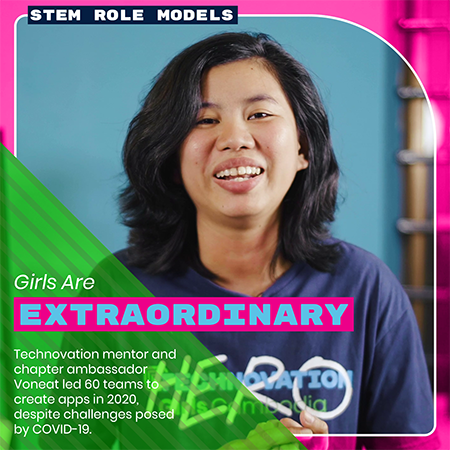
Voneat joined Technovation in 2017 as a mentor. Voneat knew that as a mentor, she would be inspiring girls as they explored science and technology. It turned out she was just as inspired by them as they were by her! Voneat returned as a mentor over the next two years, and in 2019 she was nominated to become a Chapter Ambassador. Three weeks into her first season leading her region, the COVID-19 pandemic shut everything down. Voneat and her fellow Technovation volunteers reached out to the students to learn more about the sort of support they needed. Girls in more rural areas faced extreme challenges — in addition to technical challenges, the girls faced substantial language barriers. However, the Technovation Cambodia community pulled together, and with her fellow mentors and volunteers Voneat successfully guided 60 teams to submission and held Cambodia’s first-ever virtual national pitch.
We’re featuring Voneat today because Voneat is extraordinary. In 2020 alone, she managed an impossible situation, and supported scores of girls to keep learning and stay engaged in science and technology projects. Voneat has been a vital member of the Technovation community for years, and we are so grateful to work alongside her to reach more girls and help them dream — and build — new worlds using Technology. (Watch Voneat share her 2020 story!)
Grace, Technovation Alumni, UI Student, and Inventor from Nigeria
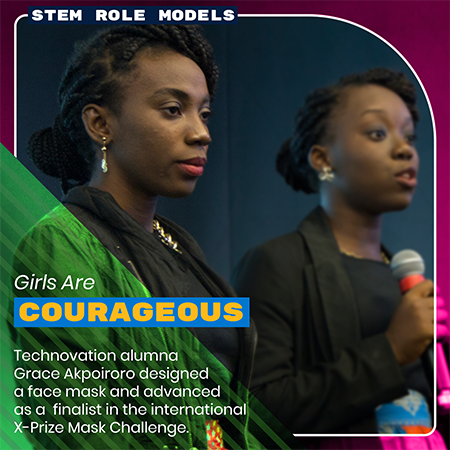 At the 2015 World Summit, Grace and her three teammates took home the grand prize for their app, Discardious, designed to help address improper waste disposal in Nigeria. Discardious and team Charis’ commitment to improving their community’s health won over judges. The following year, Grace deepened her commitment to the global Technovation community as a Student Ambassador. Determined to support more girls in her community, Grace told us “my goal is to inspire girls to see themselves not just as users of technology but as developers, inventors, and designers.” That year, Grace helped 40 girls successfully complete the program.
At the 2015 World Summit, Grace and her three teammates took home the grand prize for their app, Discardious, designed to help address improper waste disposal in Nigeria. Discardious and team Charis’ commitment to improving their community’s health won over judges. The following year, Grace deepened her commitment to the global Technovation community as a Student Ambassador. Determined to support more girls in her community, Grace told us “my goal is to inspire girls to see themselves not just as users of technology but as developers, inventors, and designers.” That year, Grace helped 40 girls successfully complete the program.
Since then, Grace has continued on her own path as an inventor, designer, and entrepreneur. In 2020, Grace and her team of young inventors developed an airtight mask for frontline workers during the COVID-19 pandemic. “Seeing photos of our medical workers with cut and scarred faces from leaky masks broke our hearts. We wanted to do something about it, so we made a mask that literally sticks to your face and doesn’t use ear or head straps.” Grace and her team idMASK were one of five finalists in a global XPRIZE Next-Gen Mask Competition. Over eight months they developed, iterated, and prototyped an innovative mask designed with doctors and nurses in mind.
We are deeply honored to have been part of Grace’s journey so far, and cannot wait to see what she does — and who she helps — next.
Gitanjali, Technovation Alumni and Time Kid of the Year from the United States
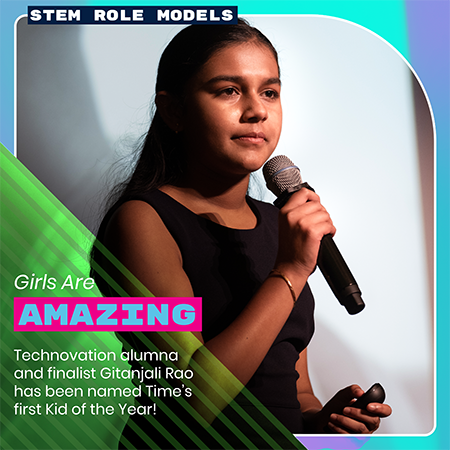
In 2019, Gitanjali created Epione, a mobile app to help doctors quickly identify signs of opioid addiction in patients. In March of 2020, she was named part of Marvel’s Hero Project. The following month she submitted another app to Technovation Girls. This second app, Kindly, uses artificial intelligence to identify and address cyberbullying. In December, Gitanjali was named the first ever TIME Kid of the Year.
And last month, in January 2021, Gitanjali joined our new live online class series to lead workshop activities and talk to current Technovation participants, helping them figure out how they too can find important problems to solve.
Gitanjali inspires us so much — not only for the solutions she’s building at such a young age, but also for the way she values talking to her peers and young women, and helping them dream up big solutions to complex problems. On this International Day of Women and Girls in Science, we celebrate Gitanjali and her commitment to building a better, safer, kinder world through compassion and science.
We also want to spotlight some incredible women in science and technology who work outside of the Technovation community.These women inspire us and motivate us to keep dreaming and building — we hope they can inspire you too.
Kizzmekia S. Corbett PhD, Research Fellow at the National Institutes of Health
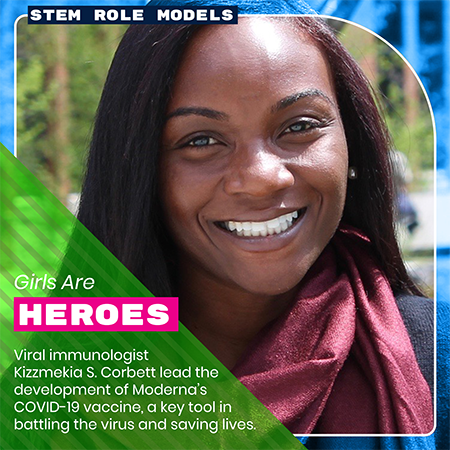 Dr. Corbett is a viral immunologist and a scientific lead for the NIH’s Coronavirus Vaccine Program. Over the last year, she and her team worked to develop a safe and effective vaccine for COVID-19 — and succeeded, with the first vaccine doses being administered in early January, 2021. Dr. Corbett’s 6+ years of studying coronaviruses and developing vaccines for those viruses made her a perfect candidate to join the team working on a vaccine when it formed in January 2020. Two months after researchers in China released the genetic sequence of the virus, the vaccine Dr. Corbett and her team had developed entered its first trial. The speed at which this vaccine has been developed and tested is incredible. In an interview with UMBC, where she earned her BA and MA, Corbett said “I’m really excited about fulfilling this proof-of-concept for pandemic preparedness, where we can literally go from receiving the genetic sequence of a virus all the way through to a vaccine clinical trial in less than three months. I think that’s somewhat of an unprecedented standard to set, and I’m looking forward to helping to standardize it. I hope that it will get even shorter.”
Dr. Corbett is a viral immunologist and a scientific lead for the NIH’s Coronavirus Vaccine Program. Over the last year, she and her team worked to develop a safe and effective vaccine for COVID-19 — and succeeded, with the first vaccine doses being administered in early January, 2021. Dr. Corbett’s 6+ years of studying coronaviruses and developing vaccines for those viruses made her a perfect candidate to join the team working on a vaccine when it formed in January 2020. Two months after researchers in China released the genetic sequence of the virus, the vaccine Dr. Corbett and her team had developed entered its first trial. The speed at which this vaccine has been developed and tested is incredible. In an interview with UMBC, where she earned her BA and MA, Corbett said “I’m really excited about fulfilling this proof-of-concept for pandemic preparedness, where we can literally go from receiving the genetic sequence of a virus all the way through to a vaccine clinical trial in less than three months. I think that’s somewhat of an unprecedented standard to set, and I’m looking forward to helping to standardize it. I hope that it will get even shorter.”
Over the last year, Dr. Corbett has clearly communicated her expertise with COVID-19 as well as coronaviruses in general (she was breaking down everything we knew about the virus as far back as January 2020) and shared her experience as a black woman leading scientific progress while the world watches — and how that can involve being doubted, overlooked, and insulted. And that’s in addition to the immense pressure scientists and researchers feel as the world waits for the vaccines they develop. Dr. Corbett continues to make history and enormous strides in viral immunology — and to communicate that science in approachable ways. She has been tweeting about her personal experience getting the vaccine. A few days ago she celebrated reaching “the day that I can start to bask in the freedom of being protected against COVID-19” — part of that celebration included a slide tracking her own antibody response, because Dr. Corbett is a scientist to her core — and we admire and support that wholeheartedly.
Mae Jemison, Astronaut & Engineer
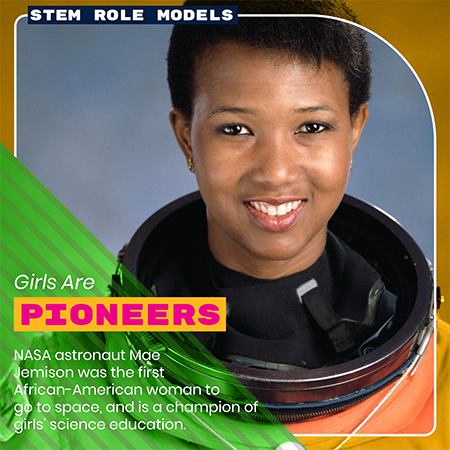 Dr. Mae Jemison was the first woman of color to go into space. She’s also a physician, engineer, and educator and she’s leading an initiative called 100 Year Starship, with the goal of ensuring humans can travel to another star in the next 100 years. She also founded the non-profit Dorothy Jemison Foundation for Excellence, which designs and implements STEM education experiences. Dr. Jemison inspires us not only because of her past accomplishments and trail-blazing, but for her continuous exploration of her curiosity and her endless innovation. Her twitter bio includes the instruction “Don’t doubt, dare!” — it’s easy to see how those three words have motivated Dr. Jemison and shaped her life and her work.
Dr. Mae Jemison was the first woman of color to go into space. She’s also a physician, engineer, and educator and she’s leading an initiative called 100 Year Starship, with the goal of ensuring humans can travel to another star in the next 100 years. She also founded the non-profit Dorothy Jemison Foundation for Excellence, which designs and implements STEM education experiences. Dr. Jemison inspires us not only because of her past accomplishments and trail-blazing, but for her continuous exploration of her curiosity and her endless innovation. Her twitter bio includes the instruction “Don’t doubt, dare!” — it’s easy to see how those three words have motivated Dr. Jemison and shaped her life and her work.
Dr. Jemison knew she wanted to be a scientist when she was in kindergarten, and was very aware of space growing up. She watched and read about the earliest space missions, and assumed that because the Apollo program had reached the moon by the time she was 11 or 12, she would be a scientist actively working on Mars by the time she grew up. But watching those missions on TV, Jemison noticed something: all the astronauts were white men. She told the National Library of Medicine, “I thought that was one of the dumbest things in the world, because I used to always worry, believe it or not as a little girl, I was like: What would aliens think of humans? You know, these are the only humans?”
Dr. Jemison worked towards the goal of bringing diversity to space travel by earning a degree in Chemical Engineering and African American Studies from Stanford University, and a medical degree from Cornell University. She then served in the Peace Corps in West Africa. When she returned to the US, Dr. Jemison continued her work as a medical doctor while also taking graduate courses in engineering and applying to be part of NASA’s astronaut program. Five years after she was accepted into NASA’s program, Dr. Jemison made history as the first woman of color to fly in space. Dr. Jemison continues to build on that incredible achievement with her ongoing work as an educator, tech innovator, leader, and engineer W.e are so inspired by her relentless spirit and curiosity, as well as her commitment to inspiring and supporting more young, diverse people to pursueSTEM.
Mayuko Inoue, Software Engineer & Content Creator
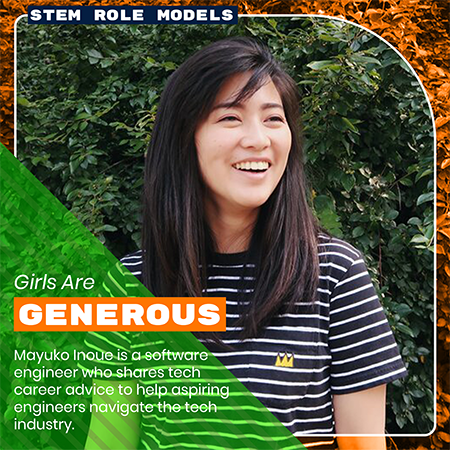 Mayuko Inoue is a Senior iOS Software Engineer who has worked at companies like Intuit, Patreon, and Netflix. She is also the founder of helloMayuko, a YouTube channel aimed at helping others find their way in the tech industry. We admire Mayuko for authentically showing us her journey as a software engineer, and the way she so clearly breaks down how to enter the field. Mayuko talks openly about things like imposter syndrome, and her advice ranges from very practical, like keyboard recommendations or tips to debug code, to bigger topics like what career paths are actually available in the field of software engineering. She also talks about just being human, including what it’s like growing up Japanese American in the US or how to cope with anxiety.
Mayuko Inoue is a Senior iOS Software Engineer who has worked at companies like Intuit, Patreon, and Netflix. She is also the founder of helloMayuko, a YouTube channel aimed at helping others find their way in the tech industry. We admire Mayuko for authentically showing us her journey as a software engineer, and the way she so clearly breaks down how to enter the field. Mayuko talks openly about things like imposter syndrome, and her advice ranges from very practical, like keyboard recommendations or tips to debug code, to bigger topics like what career paths are actually available in the field of software engineering. She also talks about just being human, including what it’s like growing up Japanese American in the US or how to cope with anxiety.
Mayuko filmed her first video in 2017 without any prior experience in video production. Today, that video, “a day in the life of a Software Engineer” has over 4.9 million views. Mayuko realized she could help the next generation of software engineers and that a lot of people feel a deep need for clear information about what it’s like to get started and work in software engineering. Mayuko’s vision is to “create a more empathetic and compassionate tech industry where individuals can express their full selves and create a positive impact in the world.”
We are grateful for Mayuko’s openness and honesty, as well as the warmth and sense of connection she offers to hundreds of thousands of people.
These women and the work they’re doing in science, engineering, and technology inspire us and keep us excited and hopeful in our work to involve more girls, women and non-binary folks in STEM fields. We love celebrating International Day of Women and Girls in Science and all it stands for — and we know we can all continue to recognize, celebrate, and invite women to explore STEM all year long.

